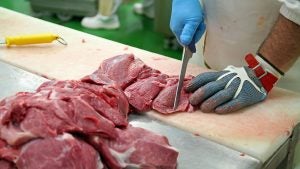California’s Proposition 12 has been all over the news for the past few years. Prop 12 requires that farmers keep veal calves, breeding pigs, and egg-laying hens in minimum-size housing. One of the biggest things to know about Prop 12 is that it forbids the in-state sale of pork that comes from breeding hogs that are “confined in a cruel manner.” It was approved by California voters back in 2018.
Since Prop 12 places these mandates even on products sold in California, that means that the farmers producing these products need to comply, regardless of where they live. For example, 13 percent of American pork is consumed in California, but one 1 percent of U.S. pigs are actually raised there. This means that farms outside of California that sell into California need to comply with Prop 12, even though they didn’t vote for it.
Prop 12 made it all the way to the Supreme Court, where it was upheld in May 2023.
In lawsuits, the National Pork Producers Council and the American Farm Bureau Federation argued that Prop 12 violated the Dormant Commerce Clause. The Dormant Commerce Clause states that no individual state can pass laws that burdens people across the country. In other words, a state can only pass laws that impose burdens on their own citizens. The Supreme Court upheld Prop 12 with the reasoning that the state of California isn’t clearly discriminating against out of state businesses. This high-profile case made waves in the agriculture industry. This was one of the biggest agricultural cases in a while.
While Prop 12 has been in effect for a while, it started to be fully enforced on January 1, 2024. The biggest thing that this means for producers is that shell eggs, liquid eggs, whole pork meat and whole veal meat need to be Prop 12 compliant. To become compliant, producers need to be audited by a third-party certification agent. The state of California has outlined a list of accredited certifying agents. California retailers are not allowed to sell products that aren’t Prop 12 compliant. Since many producers aren’t selling products directly in the state of California, they should be in contact with their packer/processor to make sure that any certification they choose to do is recognized by both the state of California and their packer.

The impacts of Prop 12 were speculated for years, and now we are seeing the results of its implementation — both in California and nationwide. Many of America’s largest pork producing companies have become Prop 12 compliant in order to continue selling their pork in California. Many independent producers have chosen not to become Prop 12 compliant due to concerns about cost. Larger companies are able to afford to become Prop 12 compliant much easier than small farms are (or at least to be able to absorb the costs into other parts of the business). Yet this impacts the abilities of some small and family owned farms to sell their products.
Another consequence of Prop 12 is animal welfare. Prop 12 was pushed by animal-rights activists, and many outsiders say it is not rooted in actual concern of animal welfare. The new implementation of Prop 12 raises concerns for animal care, safety, and health. The larger pen size required by Prop 12 can increase aggression among pigs and puts more piglets in danger. Larger pen sizes and an increase in group housing will also decrease the amount of individual attention and care that each sow (mother pig) receives.
In 2021, the California Department of Food and Agriculture noted that the self-titled Prevention of Cruelty to Farm Animals Act would increase pig mortality on breeding farms and had no positive impacts on human health and welfare, worker safety, or the environment. U.S. Solicitor General Elizabeth Prelogar, who is a Biden appointee, sided with pork producers against the animal-rights initiative.
It’s estimated that it will cost producers about $3,500 per sow to become Prop 12 compliant. The average hog farm has just over 1,200 animals. This means the average cost for each farm to become Prop 12 compliant is over $4.2 million. This cost will have a greater impact on smaller farms.

There are currently not enough Prop 12 compliant farms to keep up with the demand of pork in California. This supply shortage is greatly increasing pork costs for consumers in California. At the beginning of April 2024, the average price of pork in California had increased by 20 percent since July 2023, which is when Prop 12 first started going into effect. Pork loin prices have increased by 41 percent, bacon has increased by 16 percent, and pork ribs and shoulder have both increased by 17 percent over the same time. While price increases were expected, these price increases are higher than anticipated. Pork consumption in California has also decreased to reflect these price increases.
The consequences of Prop 12 are numerous and have huge impacts on many people. Pork costs have risen for California consumers and producers across the country are faced with decisions on whether to become Prop 12 compliant. The great cost of Prop 12 compliance is a barrier for all producers, especially for smaller farms. Animal welfare will also suffer. There are still groups lobbying for changes surrounding Prop 12, so it will be interesting to see what changes and impacts we see about Prop 12 in the future.
Michelle Miller, the Farm Babe, is a farmer, public speaker, and writer who has worked for years with row crops, beef cattle, and sheep. She believes education is key in bridging the gap between farmers and consumers.



